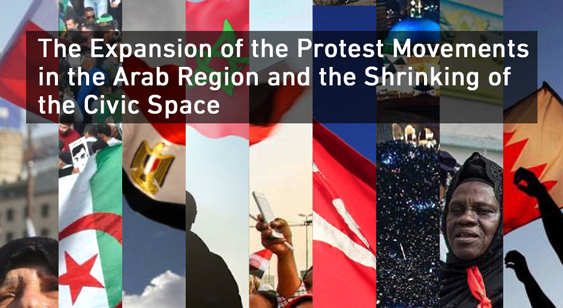
The Expansion of the Protest Movements in the Arab Region and the Shrinking of the Civic Space

The world has been witnessing a trend towards a decline in the freedoms and spaces available for civil society organizations (CSOs), especially in the Arab region. This includes increasing restrictions imposed on CSOs in law and practice, such as restrictions on registration, operation and access to resources, in addition to limiting the freedom of speech and independent press, and prosecuting activists and individuals for expressing their opinions. This restriction can include more extreme measures such as violating the right to life and to move freely, as well as physical assault, torture, forced disappearance, arrest, and other grave violations that we witness in the Arab region in particular, and outside it. The space made available for the work of civil society organizations, which has come to be called "civic space", is the basis on which any participatory democratic system is built, and the basis for any development partnership. This shrinking civic space trend is part of a larger setback in protecting human rights in general, and the crisis that democracy is suffering from, in a global context marred by the rise of populist and right-wing extremist and quasi-fascist currents. The repression practiced by the regimes against civil society, activists and dissenting voices is nothing but an attempt to stifle accountability and criticism. The alliance of governments with private interests plays a major role as well in promoting this trend. Marginalized groups are being exposed to the most heinous types of oppression when they claim their rights to equality and a decent life.
Defending civic space, documenting violations against it, following civil society news and updates in the Arab world, and enhancing its role in influencing policy are at the core of ANND’s strategy. Therefore, in addition to the processes in which the Network is involved and which contribute to strengthening the role of civil society and promoting human rights and development partnerships, ANND launched a platform to keep up with the news of civic space, with the aim of amplifying civil society voices and highlighting the violations that it is exposed to in the region. The platform also contains analytical reports, on both regional and national levels, as a contribution to understanding the current situation regarding civic space, social movements and national contexts, and as a base that can be built upon to further develop our plans and strategies as CSOs. This year, the reports, which dealt with ten Arab countries, namely Lebanon, Jordan, Iraq, Bahrain, Egypt, Sudan, Algeria, Tunisia, Morocco, and Mauritania, sought to analyze the civic space in the Arab world in light of the recent developments in the region, the most important of which is the massive waves of protests, and even the more limited social movements we witnessed.
The regional paper distinguished between CSOs, which are structured institutions whose activity continues for a long period of time, campaigns, which have a short period of time and are organized according to their requirements, and social and civil movements that are characterized by a wide numerical participation, with varying time ranges and degrees of organization. Social movements are more structured and strive to last longer. Then the paper identified four factors that leave an impact on civic space, which are the macro level (the global and national level, i.e. the nature of the political system), then the social and historical characteristics, the legislative and legal characteristics, and finally the civic space itself, i.e. the experiences that it has accumulated throughout history. The paper delves into the experience of Morocco, as a case of social movements in a climate of relative freedom and takes the women’s movement and the boycott movement as examples. Then the paper examined the experience of Tunisia as an example of a structured civil society that played a political role. The paper devoted a section to what has become known as the second wave of the Arab Spring, mainly the massive waves of protests in Lebanon, Iraq, Algeria and Sudan, and the paper elaborated on each of these experiences.
Finally, the paper extensively detailed the most important trends regarding the means and mechanisms of restricting civic space that can be drawn from these national papers. The decline in the enabling environment for civil society in the Arab region is due to many reasons, including those related to the nature of the political system. Historically, the environment of civil society ranged between restriction and complete closure in countries that lived through periods of military rule, and generally under totalitarian regimes. While the ideological aspect is usually predominant in the discourse of totalitarian regimes, the security and military aspect prevails in discourses of regimes of a dictatorial and authoritarian character, but the two models do not differ in how they deal with civil society. Most of the Arab countries range in status between restriction and relative restriction, a position whereby states provide some space for the work of CSOs under the pressure of the international community, for example, or target a specific type of activity or a certain class of organizations without others. Finally, there is a situation of partial or relative freedom that characterizes a minority of the region’s countries. These regimes have always used multiple pretexts to legitimize restrictions on civil society, such as national or revolutionary legitimacy, or the existence of other priorities in light of national conflicts, or traitors to civil society accusing it of being a cover for Islamist or leftist agendas, etc. Recently, the anti-terrorism pretext has been frequently used in limiting the freedom of civil society to operate and preventing it from accessing resources. The regional paper deals with each of these reasons and excuses.
The national papers deeply investigated each of the national contexts. Lebanon's paper examines the current wave of protests, placing it in a historical context of civic and political activism. It then relied on “a three-fold conceptual approach that focuses on the analysis of the interactions and dynamics between actors, and the strategies they employ: persuasion, coercion, and retribution,” to analyze the recent wave of protests in Lebanon. Egypt’s report examined the legal restrictions that are imposed on civil society today, reviewing the most important developments in civil society from the pre-revolution period until today. “The post-revolution period of openness in Egypt was an exemplary period for the quantitative and qualitative growth of civil society, as society developed new mechanisms to express its needs and solutions. Then a period of stagnation followed under legal, judicial and political restrictions by the state and the media. Yet, civil society continues to develop its mechanisms to defend its survival despite the circumstances of the war on terror and the exploitation of the political system.” The report examined these mechanisms of pushing back against the shrinking space, and concluded with further steps that civil society can take at this stage. As for the Sudan report, it focused heavily on the movement that toppled al-Bashir in 2019, giving an in-depth presentation of the various components that participated in the movement, the challenges that civil society faces in the transitional period, and how this affects the civil space. The Moroccan report starts from the the economic, social and political conditions in Morocco, and the movements that it has witnessed recently. Then the report examined, in light of these developments, the enabling environment for civil society, in terms of law and practice, the involvement of CSOs in national development efforts, and finally in terms of regional and international institutions’ support for a CSO enabling environment.
Finally, the report delves into the strategies used by social and civil movements in Morocco with which they faced the restrictions on civic space. As for the Algeria report, it examined the recent movement that shook the old regime in Algeria and overthrew Bouteflika producing new faces in civil and political work. “In this unprecedented revolutionary context, the authority is betting to reproduce itself as quickly as possible by changing its civilian façade and redistributing some cards [...] while the civil movement continues to resist all attempts to reproduce the system for itself. Where is the civil movement heading? And what is the role of civil society and the active forces in the movement to avoid the collapse of the situation in the country [...]?” The report starts from these questions and moves into discussing the enabling environment for civil society and addresses it in its various aspects.
In Bahrain, "the development of events since the year 2011 proceeded to further restrictions until the performance of civil society institutions weakened, as some of them were even compelled to freeze their activities and others were dissolved by the Ministry of Labor and Social Development for several reasons." The report examines the legal reality of the civil society environment and the restrictions it faces, and details both government and civil society proposals. The report also examines the composition of civil society and the challenges it faces today. The Mauritania report focused on “providing a picture of the situation of the Mauritanian civil society in terms of: (a) the space available for dialogue on national development policies; (b) the development effectiveness of civil society organizations; (c) regional and international institutions’ support for the CSO enabling environment; (d) the legal and regulatory environment.” The report also discusses the most important actors in the Mauritanian civil society, the most important issues they follow and the challenges they face. The Jordan report analyzes “the current situation of CSOs in Jordan and mainly deals with four issues: 1) providing an overview of the status of civil society movements in Jordan, focusing on recent years; 2) analyzing the legal framework, in brief, for the work of CSOs; 3) Discussing the impact of international and national intuitions on Jordanian CSO landscape; and (4) Finding strategies to challenge the increasing shrinking space.” As for the Tunisia report, it examined social movements in Tunisia and the role of civil society and the environment affecting it, noting that “social movements have become an effective factor in the civil movement [...]. The vitality of social movements multiplied after the revolution as a result of the cracking of the old system and the incomplete construction of the new and alternative system. The economic and social fragility is the defining feature of the post-revolution period. It is this fragility that drives us to say that, based on the many indicators that have been referred to in this report, that social movements are likely to continue in various shapes and sizes during the year 2020. They will continue to accompany the ongoing democratic transition in Tunisia, which is a difficult and fragile phase.” Finally, the Iraq report examined the recent protests, as a result of cumulative civil action, and the roles of the various civil society actors, as well as the violations that civil society and activists have been subjected to in Iraq, which reached their climax during the last wave of protests.
Most of these national papers stemmed from the developments witnessed by civil society on the ground, especially in countries that witnessed an unprecedented wave of protests, and placed them in their social, historical, and political context. They then discussed the roles of the various components of civil society, and the challenges that civil society faces, especially the restrictive environment in which they live. ANND seeks to develop this work by networking between the various organizations and researchers working on civic space and developing the conceptual framework that it uses in its work on the civic space. It also seeks to develop the platform and its advocacy uses.
May Makki
Recent publications

